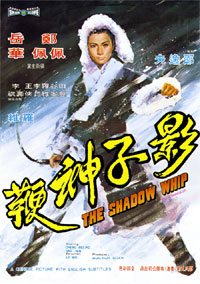| Reviews & Columns |
|
Reviews DVD TV on DVD Blu-ray 4K UHD International DVDs In Theaters Reviews by Studio Video Games Features Collector Series DVDs Easter Egg Database Interviews DVD Talk Radio Feature Articles Columns Anime Talk DVD Savant Horror DVDs The M.O.D. Squad Art House HD Talk Silent DVD
|
DVD Talk Forum |
|
|
| Resources |
|
DVD Price Search Customer Service #'s RCE Info Links |
|
Columns
|
|
|
Shaw Bros.: The Shadow Whip (Special Edition)
Cheng Pei-pei plays Yang Kaiyun, a young innkeeper in the snowy mountains of Red Pine Village. Securing supplies in Defang, Kaiyun's servant Ersha gets into a fight with three toughs who call themselves the Serial Trio (led by actor Wang Hsia). A young swordsman, Wang Jianxin (Yueh Hua), steps in to save him. Wang and others note Kaiyun's talent with a whip; as it turns out, he's looking for Feng Chengtian, the legendary Shadow Whip, whom Wang blames for the death of his father. Kaiyun insists that her reclusive uncle (Tien Feng) couldn't possibly be the famous whip master, but neither Wang nor the Serial Trio believe her.
They converge on the inn, along with Chief Hong Dapeng (Ku Feng), master swordsman of Shenwei Fort (he walks over snow without leaving any footprints), and the "16 Bandits of Yanyun." Pretty soon, Kaiyun, Wang, and the uncle are fending off a hundred warriors with swords and daggers, all in a day's work for a Shaw Bros. star. The plot eventually hinges on stolen jewels and Kaiyun's efforts to clear her uncle's name, all of which comes to a head during the film's lively (and, of course, action-filled) climax.
The Shadow Whip is nothing more or less than 79 minutes of virtually non-stop action set pieces with just enough exposition and melodrama to hold its thin story together. Filmed in glorious Shaw Scope, the wide screen fight choreography may seem primitive by today's standards, but despite the occasionally visible wire works lifting Cheng Pei-pei and others as they leap from rooftop to rooftop, the lack of CGI assists and a reliance on clever cutting is refreshing to this reviewer.
The actress isn't beautiful in the conventional sense, but she has a charm uniquely her own. She projects both an innocence and toughness (she wields her whip with convincing authority), and was more versatile than many of her fellow actresses then under contract to the Shaw brothers. (I recommend her Japanese-style musical Hong Kong Nocturne as a good example of her diverse talent.) She's well matched with the likeable Yueh Hua.
The film bounces between Shaw Bros. stages (and its extensive backlot) and marvelous location footage shot in the mountains. Tomas Chow is credited with the film's score but presumably actually wrote little beyond the charming song Ersha sings in the film's opening scene. Like a lot of Hong Kong action films, director Lo Wei's especially, most of the film is crammed with cues pilfered without credit or compensation from Western sources, notably the music of John Barry. The Shadow Whip uses cues from Barry's On Her Majesty's Secret Service and possibly other James Bond scores.
Video & Audio
The Shadow Whip is presented in a problematic 16:9 enhanced transfer from 2003 that retains the film's original Shaw Scope (2.35:1) theatrical aspect ratio, but appears sourced from a PAL master. The image is a little soft, but more annoying is the jerkiness that becomes apparent whenever there's an under-cranked fight sequence, and in some of the panning shots. The Mandarin soundtrack is offered in both its original mono and an aggressive 5.1 remix with optional English subtitles. The subtitles appear to be a refinement of those used on the Hong Kong DVDs.
Extra Features
Supplements include no less than 11 faux trailers for other Shaw Bros. titles; these were created to promote the DVD and VCD releases in Hong Kong and are cut in a more contemporary style. (The Hong Kong DVDs generally included the original theatrical trailers, but these aren't offered here.) They're in 16:9 enhanced format but not subtitled.
Also included are 13 more trailers for non-Shaw Bros. Hong Kong titles. They're likewise enhanced but not subtitled, but make a mini-festival of goofy action all by themselves.
Finally, slide shows in enhanced format offer a behind-the-scenes gallery and production stills gallery, both of which are quite good, a big improvement over the Hong Kong Shaw DVDs that this reviewer has seen, and include some terrific color images.
Parting Thoughts
Unlike the Japanese film companies of the same era that struck a balance between innocuous program pictures and cinematic art, Hong Kong's moviemakers almost never ventured beyond guaranteed crowd-pleasures that offered lots of eye candy, clear-cut heroes and villains, and an orgy of action. In this sense The Shadow Whip fits the bill. It ain't art, but it makes for nearly 80 minutes of lively entertainment and Cheng Pei-pei makes it memorable.
Film historian Stuart Galbraith IV's most recent essays appear in Criterion's new three-disc Seven Samurai DVD and BCI Eclipse's The Quiet Duel.
|
| Popular Reviews |
| Sponsored Links |
|
|
| Sponsored Links |
|
|
| Release List | Reviews | Shop | Newsletter | Forum | DVD Giveaways | Blu-Ray | Advertise |
|
Copyright 2024 DVDTalk.com All Rights Reserved. Legal Info, Privacy Policy, Terms of Use,
Manage Preferences,
Your Privacy Choices | |||||||














